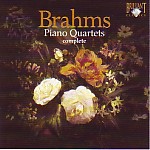Among recommendable versions of the Brahms Piano Quartets, these 1996 recordings continue to wear well. Their high points are many, starting with the G minor’s lithe yet truly “ma non troppo” Intermezzo and a Rondo alla Zingarese that crackles with energy and abandon yet never spirals out of control. The A major’s opening movement stands out for pianist Derek Han’s elegant legato chord playing and his partners’ supple responses, while the Poco adagio is effectively brisker and leaner than we often hear. In the Scherzo, the string players first state their unison theme with no vibrato and gradually open up their collective tone as the musical argument finds its lyrical legs. The musicians also are fully attuned to the C minor quartet’s volatile dramatic contrasts, frequent rhythmic displacements, and unpredictable turns of harmony. Furthermore, it’s heartening to hear how violinist Isabelle Faust’s seasoned musicianship and flexible virtuosity was already in place at such an early stage in her career. In short, this release is sure to satisfy more than budget-minded collectors looking for all three Brahms Piano Quartets in one package.
































